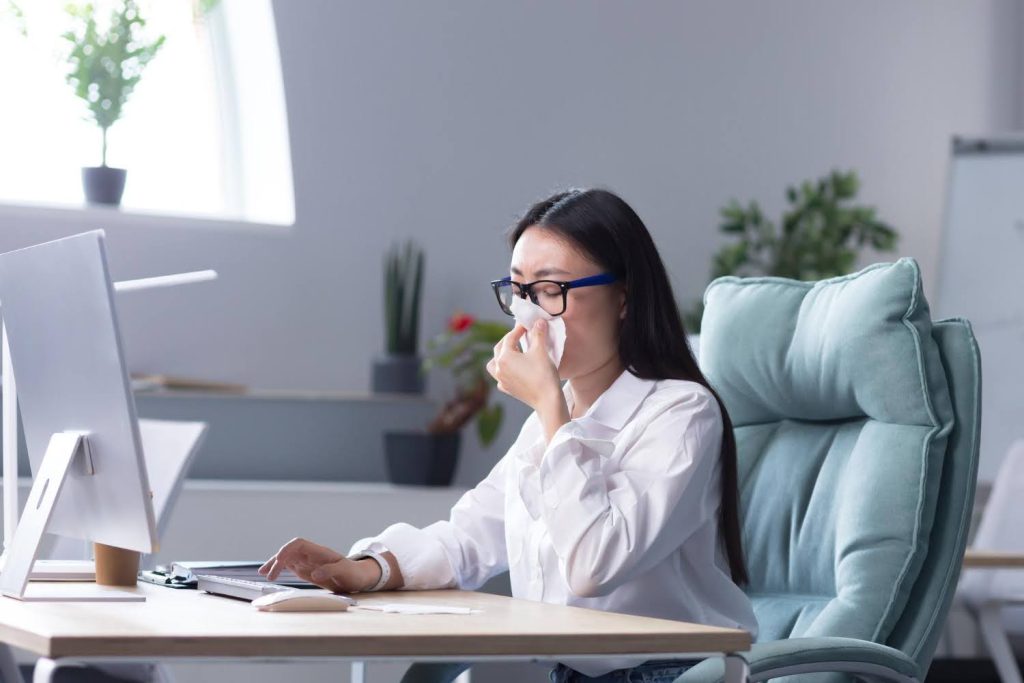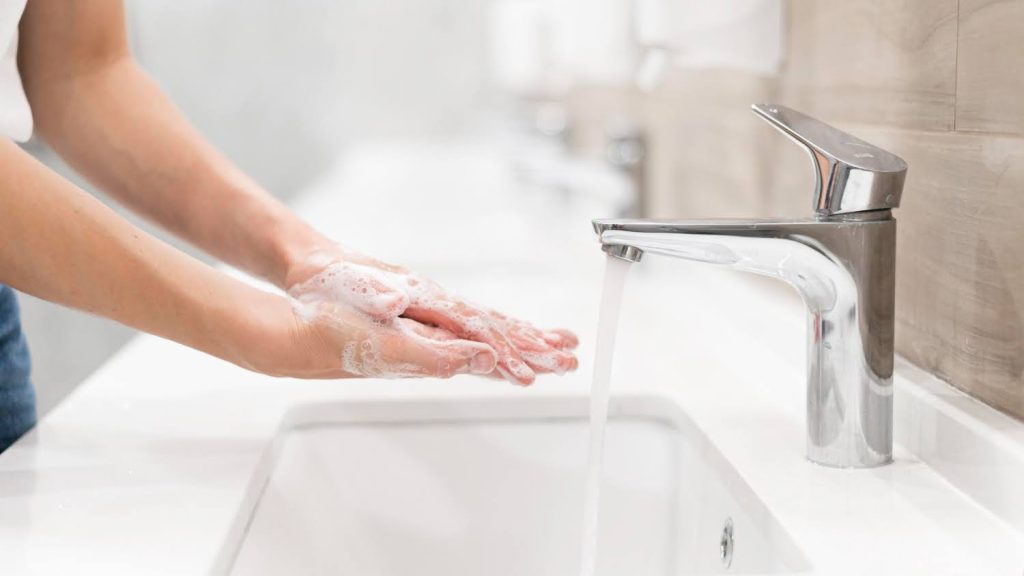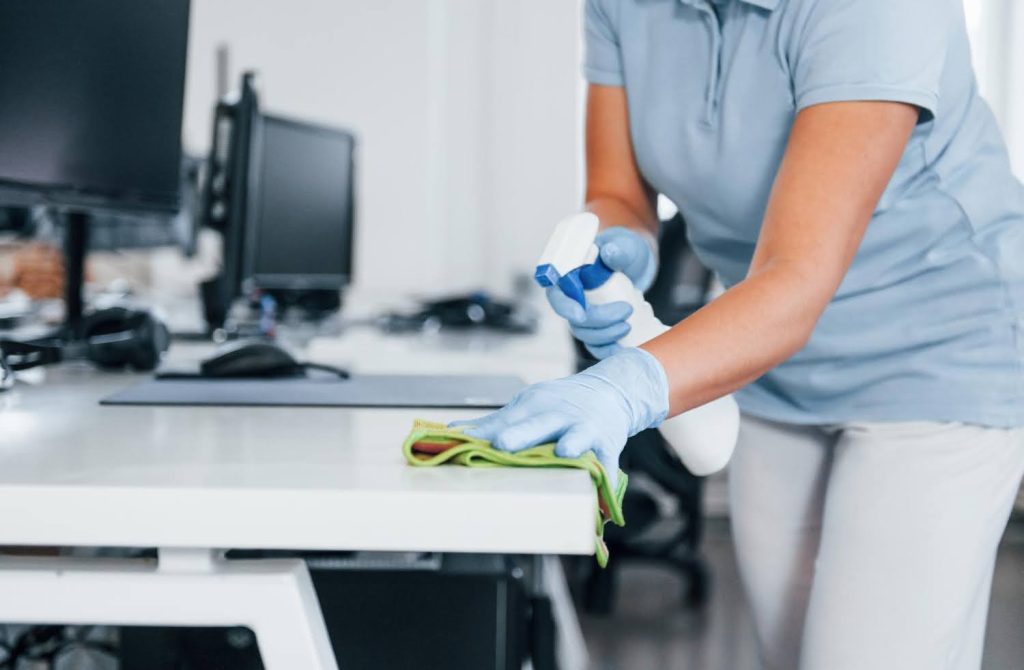Keeping good health habits in the office is key. When staff get sick, it’s not just about them feeling unwell. It affects the whole office.
Work gets delayed, people feel stressed, and the team doesn’t work as well together. Stopping germs from spreading is essential to keep the office running smoothly.
That’s why we wrote this article. We want to give you easy-to-follow tips on how to prevent the spread of germs so your office can be a healthier and more productive place.

What Are Germs?
Germs are microorganisms, including bacteria, viruses, fungi and protozoa, found everywhere in our environment.
Found in air, water, soil and on various surfaces, germs play different roles in our ecosystem. While some are beneficial or harmless, others can be pathogenic and lead to illness.
In office settings, germs can spread in multiple ways — respiratory droplets (sneezing or coughing), food contamination, direct contact (handshakes or shared equipment) or even via pets.
Different Types Of Germs
Let’s explore the various germs in an office setting, their modes of transmission and tips on managing them.
Bacteria
Bacteria are tiny, single-celled creatures that you can find all around your office – on keyboards, door handles, phones and other frequently touched surfaces.
What makes bacteria a concern is their ability to survive for days on these surfaces. This endurance increases the risk of spreading infections within the office, such as food poisoning or respiratory illnesses.
To effectively manage this risk, it’s essential to disinfect these common areas regularly. Using antibacterial solutions, such as Lysol and Dettol antiseptic liquid, is a key step in this process.
These solutions are designed to target and eliminate bacteria, reducing their ability to cause harm. Regular disinfection routines can also significantly lower the chances of bacteria-related illnesses in your office.
Viruses
Viruses are unique in that they need living hosts to survive, but that doesn’t mean they aren’t a threat on inanimate surfaces. In the office, they live in the same places bacteria do – like keyboards, door handles and phones.
Flu viruses are a common concern, capable of surviving on hard surfaces for several hours, even up to a couple of days.
To prevent the spread of viruses, be sure to practise thorough cleaning with cleaning solutions specifically designed to kill viruses, known as virucides, such as Clorox disinfecting bleach. These are particularly crucial during flu season when the risk of transmission is high.
Coupled with good hygiene practices – like regular hand washing and using hand sanitisers – thorough cleaning with virucidal cleaning solutions is an effective defence against the invasion of viruses in your workspace.
Fungi
Fungi, including moulds and yeasts, are often found in office spaces that tend to be damp, such as bathrooms and kitchens. These areas provide the perfect environment for fungi to grow.
The spores released by fungi can be a source of allergies and respiratory problems, posing a health risk to everyone in the office.
To effectively stop the spread of fungi, it is essential to maintain regular cleaning routines, focusing mainly on areas prone to dampness.
In addition to cleaning, controlling moisture levels in these areas is crucial. Practise proper ventilation, use dehumidifiers or promptly fix leaks.
Protozoa
Protozoa are primarily water-borne organisms, and while they might be less common in typical office settings, they can become a concern in areas with contaminated water supplies. These microscopic creatures can pose health risks if ingested or encountered.
To safeguard against the potential spread of protozoa in the office, it’s crucial to focus on water hygiene practices.
This includes ensuring the office water supply is clean and safe for consumption. Regular checks and maintenance of water dispensers, filters and plumbing systems can help prevent contamination.
Additionally, providing access to safe bottled water or installing water purification systems can be effective strategies to reduce the risk of protozoan contamination in office environments.

How To Stop Germs From Spreading And Stay Healthy
Simple yet effective practices can make a big difference in preventing the spread of germs. Let’s dive into the most effective ways to prevent germs from spreading and ensure a healthy workplace.
1. Wash Your Hands To Prevent Spreading Germs
Proper handwashing is among the most effective methods to stop the spread of germs in the office. The CDC recommends proper handwashing:
- Begin by wetting your hands with clean, running water. It can be warm or cold.
- Apply a generous amount of soap to cover all hand surfaces.
- Lather and scrub your hands for at least 20 seconds. Remember to clean between your fingers, under your nails, and the backs of your hands.
- Rinse your hands well under clean, running water to wash away the soap and any loosened germs.
- Dry your hands using a clean towel or air dry them.
This simple yet effective routine, when done regularly, can reduce the spread of germs and maintain a healthier office environment.
2. Schedule Regular Office Cleaning To Eliminate Germs In The office
Maintaining a clean office is essential in the battle against germ spread, and regular office cleaning plays a pivotal role in this.
High-touch areas like door handles, elevator buttons, desks, and shared equipment are hotspots for germs and require frequent disinfection.
Hiring a commercial cleaning company offers several benefits:
- Expertise And Efficiency: Professional cleaners are trained in disinfecting and cleaning commercial spaces. They are equipped with the right tools, like HEPA vacuums and electrostatic sprayers, and knowledge to target germ-prone areas effectively.
- Customised Cleaning Solutions: Commercial cleaning services can tailor their cleaning services to the specific needs of your office, taking into account the size, foot traffic and unique requirements of your workspace.
- Consistent Quality: With professional service, you can expect consistent cleanliness. Regular schedules ensure that all office areas are maintained to a high standard, reducing the likelihood of germ buildup.
- Saves Time And Resources: Outsourcing cleaning tasks allows employees to focus on their work without the added burden of cleaning duties. It also eliminates the need for the office to manage cleaning supplies and equipment.
- Healthier Work Environment: A professionally cleaned office reduces the presence of germs, dust and allergens, contributing to a healthier environment for everyone. This can lead to fewer sick days and improved overall well-being of the staff.
3. Avoid Sharing Personal Items To Reduce The Risk Of Spreading Germs
It’s common for items like cups, mugs, and cutlery to be shared among colleagues in an office setting. However, this practice can significantly increase the risk of cross-contamination and the spread of germs.
To minimise this risk, it’s advisable to encourage employees to use their own items. Offices can facilitate this by providing each staff member with individual, labelled storage spaces for their personal items.
Additionally, implementing a policy where each employee is responsible for cleaning their own items can further reduce the risk of germ transmission.

4. Cough Or Sneeze Into Elbows To Prevent Germs From Spreading
Adopting good respiratory etiquette is crucial in an office environment. Encouraging employees to cough or sneeze into their elbows instead of their hands can significantly reduce the spread of respiratory germs.
This practice is particularly effective in preventing the spread of droplets that may contain viruses or bacteria. Providing easy access to tissues and ensuring enough closed bins for their disposal can also help maintain a hygienic workspace.
Furthermore, it may be beneficial to have reminders or educational posters around the office to reinforce the importance of these practices.
5. Provide Hand Sanitisers For Better Office Hygiene
Hand sanitisers are vital in maintaining hand hygiene, especially when soap and water are not readily available.
Offices should ensure that hand sanitisers containing at least 70% isopropyl alcohol are accessible in key entrances, meeting rooms and communal areas.
Regular use of hand sanitiser can quickly reduce the number of germs on hands, making it an effective measure against the spread of illness.
Encouraging employees to use hand sanitiser after touching shared surfaces or equipment can further enhance the overall hygiene of the office.
6. Stay Home When Sick For Better Disease Control
Encouraging a culture where employees feel comfortable staying home when sick is essential in preventing the spread of illness within the office.
Offices can adopt flexible sick leave policies to support this. This helps the unwell employee recover and protects the rest of the team from potential exposure to infectious illnesses.
Promoting remote working tools and virtual meetings can also ensure that work continues smoothly, even when a team member cannot be physically present.
By fostering an understanding and supportive approach towards sick leave, offices can maintain a healthier, more productive workforce.
Conclusion On How To Prevent The Spread Of Germs
Preventing the spread of germs in the office requires a combination of personal hygiene practices and environmental cleanliness. Regular cleaning, responsible personal habits, and awareness of how germs spread are key.
If you’re considering hiring a commercial cleaning company, ESP Cleaning Services offers comprehensive disinfection services for offices, industrial spaces, schools and fitness centres. Simply request a non-obligatory quotation today to get started.
Frequently Asked Questions On How To Prevent The Spread Of Germs
Isn’t Commercial Cleaners Too Expensive For Our Small Office?
While cost is important, investing in commercial cleaners can be more economical in the long run.
Professional cleaners offer thorough and efficient cleaning that can reduce the frequency of employee sickness and related productivity losses.
Additionally, many cleaning services offer flexible packages tailored to different budgets and office size needs.
Can’t Our Employees Just Clean Their Spaces To Save On Hiring Professionals?
While employees can maintain their own workspaces, professional cleaners provide a level of deep cleaning and disinfection that goes beyond surface tidying.
Commercial cleaners are trained to target germ hotspots and use specialised equipment and products, ensuring comprehensive cleanliness that regular employee cleaning might miss.
How Can We Trust An Outside Service To Consistently And Reliably Clean Our Office?
Reputable commercial cleaning services are built on consistency and reliability. Choosing a service with good references and reviews is advisable, and many offer satisfaction guarantees.
These services often conduct regular staff training and assessments to maintain high standards, ensuring dependable quality in their cleaning routines.
What Role Does Humidity Control Play In Preventing Germ Spread In Offices?
Maintaining an optimal humidity level (between 40% and 60%) in the office can help reduce the spread of certain germs. Viruses and bacteria are less likely to survive in these humid conditions.
Also, proper humidity levels benefit respiratory health, which can indirectly support the body’s ability to fend off germs.
Is Implementing A ‘No Handshaking’ Policy To Reduce Germ Spread Beneficial?
Implementing a ‘no handshaking’ policy can be beneficial in reducing the spread of germs, especially during flu season or in the midst of an outbreak.
Encouraging alternative greetings, like a wave or a nod, minimises direct physical contact and reduces the chance of transmitting germs.

